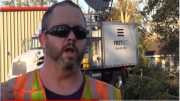By Richard Mirgon, Public Safety Consultant
Part two is intended to focus on other issues related to Verizon and their recent announcement on their desire to move forward with public safety. They made this easy this last week with two news items.
As we all know and talk about how network reliability is critical, that ties directly to carrier responsibility. We know that every carrier and every public safety agency has had outages. It happens. However, one key factor is responsibility and that also ties directly to commitment. This week Verizon showed us the failure in taking responsibility for critical public safety service.
This link, https://www.themountainmail.com/free_content/article_c91ed9fe-970a-11e7-ac9d-97908dd9aaad.html , related to a 911 network failure in Colorado isn’t so much about the failure of the network as it is about the failure of Verizon to take responsibility. According to this article Meagan Dorsch with Verizon explained that the company can only guarantee the redundancy of their own network. If they can’t stand behind their 911 network end to end then how can they be the provider for public safety communications?
Last week I talked about commitment and Verizon’s failures out West. We saw that play again this week as described in the following linked article. https://arstechnica.com/information-technology/2017/09/verizon-kicks-8500-rural-customers-off-network-for-using-roaming-data/ Verizon is dropping thousands of customers in 13 rural states where they had made commitments to them because it is “no longer profitable”. That was part of my point with rural 911 service last week. If it isn’t profitable then Verizon cuts them off. There clearly is not a corporate culture to support rural America. They view each of these states or areas as profit centers. FirstNet doesn’t operate that way and we always knew it would take a single nationwide network to provide service to all first responders. The vast majority of the states can’t financially sustain the network. It takes everyone to make this work financially under one network. AT&T acknowledges this and has accepted that responsibility.
This goes to my next issue. One of the biggest key issues on the D Block battle and the intent behind what became FirstNet is “A SINGLE INTEROPERABLE NATIONWIDE NETWORK”. Those are all key words. Experience tells us you cannot have full interoperability with multiple networks. We have tried in public safety and failed. Specific examples of this attempt and failure occurred in the two states where I spent my public safety career, Colorado and Nevada. They both tried and failed to have multiple networks, expecting full interoperability, and didn’t get there. When you look at the 20 year history in these states, politics got in the way as Governors, legislatures and management changed. Large jurisdictions built their own systems because they could. Therefore money didn’t get allocated for upgrades in state systems and all cost more than anticipated. Yes, they built gates to create a level of interoperability, but it was low level and only local.
I have been in meetings where people have said “I don’t need my users to talk to X”. And those statements almost always came from non-first responders. In the last three months, I sat in a room where a representative from a state FirstNet office clearly said their state didn’t need national interoperability because they don’t have disasters like 9/11. Needless to say, the room of first responder’s jaws dropped. It wasn’t but a few weeks later that national resources started moving into that person’s state to fight wildland fires, protect homes and cities. This person did not only not understand the risk in their state, they didn’t understand how first responders work. Here is what else many people don’t understand. Today, there are resources from all over the nation working in hurricane struck areas protecting life and property. People who MUST have the ability to communicate with other resources. These same people come from Nevada, Colorado and across the nation risking their lives for people they don’t know. How many more lives can they save or protect if they had full situational awareness? We owe them a single nationwide interoperable network that is not motivated by the desire of some to “build their own” or to “keep their customer base”.
Which now takes me back to my issue with Verizon. It’s a large company with a lot of good people and smart people that I respect a lot. However, they were there in the beginning of the D Block/FirstNet process. They know all the issues I have outlined. They had the chance to participate and they didn’t. Shame on them. The fact is they are putting at risk our goal of a “single nationwide interoperable network”. You cannot have different networks and have them 100% interoperable. And yes, I get the fact that you technically could, but because of policy and competing corporate interests, it won’t happen with two networks. It will be difficult enough for all the different apps within the FirstNet to be interoperable under one carrier.
If you remember anything from this blog remember this: FirstNet was built and designed by public safety for public safety. I know that because I was there with the rest of the Public Safety Alliance that guided the legislation. FirstNet built the requirements and awarded a contract that dictates how AT&T will deliver FirstNet services to first responders. AT&T is responsible for the network end to end and they can’t drop a customer because that region isn’t profitable. There is a permanent legislative mandated body, FirstNet, which is overseen by public safety for public safety. FirstNet provides full and daily oversight of the contract AT&T was awarded. Verizon has zero oversight and today not even a fully backed plan. All they have done is disrupt public safety by implying they can deliver Band 14 which they have zero legal right to do. I will assert that Verizon’s primary motive is to maintain a customer base they are afraid of losing. Also let me leave you with this thought. When you hire people or evaluate them don’t you look at past performance and motivation? Go back to Part One where I talked about Verizon backing away from 911 and look at their failure to participate early on with FirstNet. That should say something.
Richard Mirgon is a Public Safety consultant focused on FirstNet. He is a Past President of APCO International and has over 35 years of public safety and first responder experience. For more information about the author please go to https://www.presidential-partners.com/the-partners/




My husband and I are both first responders and signed up for AT&T’s First Net. It has cost us many hours of our time to deal with phone incompatibility with the local old technology cell tower, to multiple billing errors and bill padding. I do not recommend First Net to others in rural locations that have old technology cell towers or First Net through AT&T due to the billing issues.